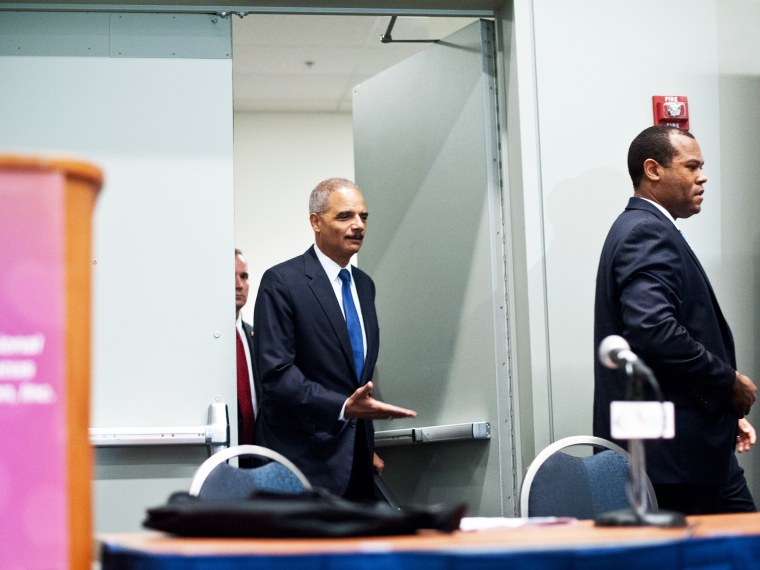This story has been updated and a correction appended.
Attorney General Eric Holder said Friday that the Justice Department will continue its efforts to protect voting rights in the wake of the Supreme Court's decision which gutted the Voting Rights Act earlier this summer.
During remarks to the Congressional Black Caucus, Holder explained that the lawsuits filed to stop Texas's discriminatory redistricting and voter ID laws are "just the beginning."
"Thanks to the hard work of our Civil Rights Division, we are continuing to refine and re-focus current enforcement efforts across the country," he said. "And while the suits we’ve filed in Texas mark the first voting rights enforcement actions the Justice Department has taken since the Supreme Court ruling, they will not be the last."
So far, the Justice Department has filed lawsuits to block redistricting and voter ID laws in Texas, along with pushing to see the state returned to preclearance under a different provision of the Voting Rights Act that remains intact after the Supreme Court ruling.
Earlier this week, the NAACP and Mexican American Legislative Caucus filed a lawsuit joining the DOJ in its attempt to block the voter ID law.
Texas Attorney General Greg Abbott called the Justice Department's efforts a "scheme" to win Texas for Democrats.
In a court brief, Abbott wrote that Texas' redistricting efforts “were motivated by partisan rather than racial considerations.”
“It is perfectly constitutional," he argued, "for a Republican-controlled legislature to make partisan districting decisions, even if there are incidental effects on minority voters who support Democratic candidates.”
Without that preclearance requirement, Texas and other states can pursue potentially discriminatory voting changes without federal oversight, which puts the burden on the DOJ and other civil rights groups to prove discrimination in court. If Congress were to restore the Voting Rights Act by rewriting the preclearance coverage map thrown out by the Supreme Court, the DOJ's job would get easier.
That seems unlikely, but Holder said, "It is my hope--and expectation--that, together, we can find a responsible way to move forward, recognizing that the country we love is greater than the interests of any short-term goals," he said.
And at least one other man in attendance at the CBC event seemed hopeful that could be done. Republican Rep. Jim Sensenbrenner also spoke at the event. "America still needs the Voting Rights Act," he said.
He talked about the importance of the law in protecting against both "overt" forms of racial discrimination and "subtler" ones, but admitted it will be difficult to get Congress to fully restore the law.
"I am proud that with all the disagreements in Washington, voting rights still enjoy significant bipartisan support," he said. "We have an uphill battle, but I do not believe that politics have changed so much that saving the VRA isn't possible."
"Voter discrimination still exists, and our progress toward equality should not be mistaken for a victory," he added.
"There is at least one Republican, and you'll find out in the future a lot more, that is committing to putting life in this most important civil rights act that got a stab in the back from the Supreme Court," he said.
Correction: An earlier version of this story stated incorrectly that Texas argued in court that its redistricting efforts “were designed to suppress Democratic votes, rather than minority votes.” The state did not claim to be attempting to suppress any votes.
